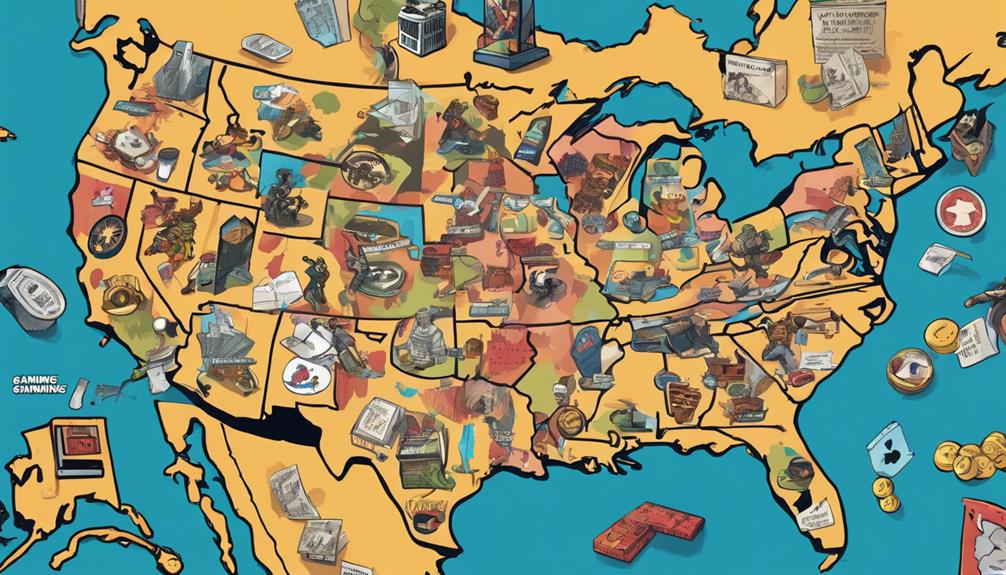Playing games online for money is legal, but laws differ by country and US states. Compliance is key to avoid legal consequences, as regulations are critical in online gaming. Knowing your state's rules is essential. Understand payment restrictions under UIGEA. Federal laws like the Wire Act impact online poker legality. States can legalize and regulate online gaming. New Jersey, Connecticut, Delaware, Michigan, and Pennsylvania allow online gambling. Stay informed to steer clear of legal issues while enjoying online games. Keep learning about the legal framework for a smoother gaming experience.
Key Takeaways
- Regulations govern online gambling legality, varying by country and state.
- Compliance is essential to avoid legal consequences in online gaming.
- Understanding state-specific regulations is crucial for playing games online for money.
- UIGEA restricts payment processing for online gambling sites, focusing on financial transactions.
- Federal and state laws impact online poker legality, with varying regulations in legal iGaming states.
Online Gambling Laws Overview
To navigate the complex landscape of online gambling laws, you must be aware of the regulations governing this activity. Gambling laws play an important role in determining the legality of playing games online for money. These laws vary significantly by country and can even differ within different states in the US.
Understanding the legal framework surrounding online gambling is essential to guarantee compliance and avoid potential legal consequences.
In the US, the Unlawful Internet Gambling Enforcement Act (UIGEA) is a federal law that imposes restrictions on online gambling activities. While some states have chosen to legalize online gambling, others maintain strict regulations against it.
This patchwork of laws creates a diverse and sometimes confusing environment for individuals looking to engage in online gambling activities.
UIGEA and Payment Restrictions

The Unlawful Internet Gambling Enforcement Act (UIGEA) placed strict restrictions on payment processing for online gambling sites when it was enacted in 2006. Despite its goal to curb online gambling, UIGEA mainly targeted the financial aspect by making it more challenging for these sites to collect payments from players.
This legislation didn't outright ban online gambling but focused on regulating the transfer of funds. UIGEA prompted individual states to create their own rules for overseeing legal online gambling activities, leading to a diverse regulatory landscape across the country.
Under UIGEA, specific provisions limit financial transactions associated with online gambling, adding a layer of complexity for both operators and players. With states now empowered to legalize and regulate online gambling within their borders, the enforcement and interpretation of UIGEA can vary significantly from one state to another.
It's essential to understand these payment restrictions when engaging in online gambling to ensure compliance with UIGEA and state laws.
Federal Vs. State Jurisdiction

Federal and state jurisdictions play pivotal roles in shaping the landscape of online gambling in the United States, with regulations differing to a great extent between the two levels of government.
When it comes to online poker, the Federal Wire Act of 1961 and the Unlawful Internet Gambling Enforcement Act (UIGEA) are federal laws that impact its legality. The Wire Act prohibits certain types of betting businesses from operating in the United States, affecting online poker across state lines. On the other hand, the UIGEA focuses on restricting payment processing for illegal online gambling activities.
State governments have the authority to legalize and regulate online poker within their jurisdictions, leading to a varied legal environment for players across the country. This patchwork of regulations means that the legality of online poker can vary substantially depending on the state in which you reside.
As more states consider expanding their online gambling offerings, the landscape continues to evolve, potentially opening up more opportunities for online poker enthusiasts.
Legal Igaming States List

Among the states where iGaming is legal are New Jersey, Connecticut, Delaware, Michigan, and Pennsylvania. These states in the United States have implemented regulations that permit online gambling operations.
Nevada, New Jersey, Connecticut, Delaware, and Michigan each have varying regulations when it comes to online gambling. The legal landscape for iGaming differs from state to state, as each state has specific laws and requirements for legal online gaming.
It's important to understand that the legality of playing games online for money can change based on the state you're in. So, if you're considering participating in online gambling, it's essential to be aware of the laws and regulations in your specific state to make sure that you're engaging in legal activities.
Stay informed about the legal iGaming states list to avoid any potential legal issues while enjoying online gaming.
State-Specific Gambling Regulations

You should be aware that each state in the US has its own set of gambling laws, including regulations on online gaming and restrictions on wagering money. Understanding the specific regulations in your state is vital when participating in online gambling activities.
From state gambling laws to online gaming regulations, staying informed about the legal landscape will help you navigate the complexities of online gambling.
State Gambling Laws
Each state in the US has its own specific regulations and laws regarding gambling, including rules on playing games online for money. State gambling laws play a pivotal role in determining the permissibility of online gaming for money within state boundaries. These laws can vary notably from one state to another, impacting the legality of online gambling activities. Before participating in online gaming for money, it is vital to be well-versed in your state's specific regulations to steer clear of any potential legal issues. Factors such as age restrictions, licensing prerequisites, and the types of games permitted can differ greatly under state gambling laws. For instance:
| State | Online Gambling Legality |
|---|---|
| New Jersey | Legal |
| Pennsylvania | Legal |
| Nevada | Legal |
| Utah | Prohibited |
Understanding the nuances of your state's gambling laws, including how they intertwine with contract law, is essential for anyone considering engaging in online gaming for money.
Online Gaming Regulations
State-specific gambling regulations across the United States determine the legality and parameters of online gaming for real money. Various states have taken different approaches to online gambling, with some like New Jersey, Connecticut, Delaware, Michigan, and Pennsylvania legalizing and regulating it.
Nevada is particularly renowned for its stringent gambling laws, reflecting the diversity of regulations seen nationwide. The Federal Wire Act of 1961 and the Unlawful Internet Gambling Enforcement Act (UIGEA) also influence online gambling regulations at the federal level.
This results in a patchwork of rules and restrictions, as each state exercises its authority to decide on the permissibility of online gambling within its borders. As a result, the landscape of legal online betting in the US continues to evolve, shaped by both state and federal laws governing real money gaming activities.
Money Wagering Restrictions
Understanding the money wagering restrictions in your state is vital for navigating the legal landscape of online gaming for real money. Each state in the US has its own set of gambling regulations, determining whether wagering real money on online games is allowed.
States like Nevada, New Jersey, Delaware, Michigan, and Pennsylvania have embraced online gambling with real money, while others have stricter prohibitions in place. State-specific laws play an important role in dictating the legality of engaging in online gaming for money, highlighting the importance of compliance with local regulations.
Future Trends in Igaming Legality

An increasing number of states in the US are paving the way for future trends in iGaming legality by expanding online gambling regulations. This shift indicates a significant transformation in how online gaming is perceived and regulated.
As you navigate the evolving landscape of iGaming legality, consider the following key points:
- Diversification of Online Gaming Offerings: States are exploring the legalization of various forms of online gambling, including sports betting and casino games, to cater to a wider audience and boost revenue streams.
- Enhanced Regulatory Frameworks: The evolution of state-by-state laws signifies a trend towards more thorough regulations that aim to balance consumer protection, revenue generation, and responsible gambling practices.
- Collaborative Enforcement Efforts: The future of iGaming legality may entail increased cooperation between states and federal authorities to streamline regulations and enforcement mechanisms, ensuring a more cohesive and effective oversight of the industry.
Stay informed about these future trends in iGaming legality to make informed decisions when engaging in online gaming activities.
Frequently Asked Questions
Is It Legal to Play Online Games for Money?
Playing online games for money can be legal in certain jurisdictions, but it varies based on local laws. Check regulations and platform rules. Research thoroughly and seek advice to guarantee compliance with laws.
Can You Really Play Games Online for Money?
You can really play games online for money! Did you know that over 60% of online gamers have tried competing for cash prizes? Check the rules in your area, pay attention to regulations, and enjoy the thrill of gaming for real money!
Is Playing Video Games for Money Gambling?
Playing video games for money may be considered gambling based on laws. Understand the rules in your area. Seek legal guidance if unsure. Compliance with regulations is essential for platforms facilitating such activities.
Is It Illegal to Play Card Games for Money?
Playing card games for money can be illegal. Know your state laws. Understand exceptions. Breaking rules leads to consequences. Stay informed and play responsibly. Laws vary, so always be cautious and informed. Be aware that while some states may allow certain types of card games for money, others may have stricter regulations. It’s important to also consider the implications of using card games as side hustles for extra income, as this could potentially lead to legal issues if not done in accordance with the law. Always consult with legal professionals or authorities to ensure you are operating within the boundaries of the law when it comes to playing card games for money as a side hustle for extra income.
Conclusion
So, can you legally play games online for money?
The answer is: it depends. With federal restrictions like UIGEA in place, maneuvering the world of online gambling can be tricky. While some states have legalized igaming, others have strict regulations in place.
The future of online gambling legality is uncertain, with trends pointing towards a mix of state-specific regulations and potential federal changes. It's a gamble, but knowing the rules can help you play smart.









